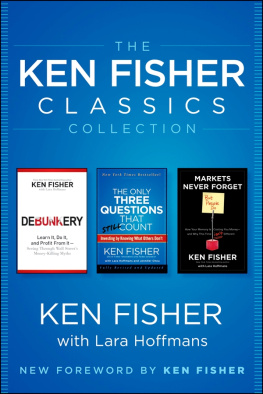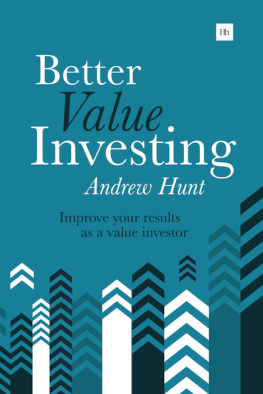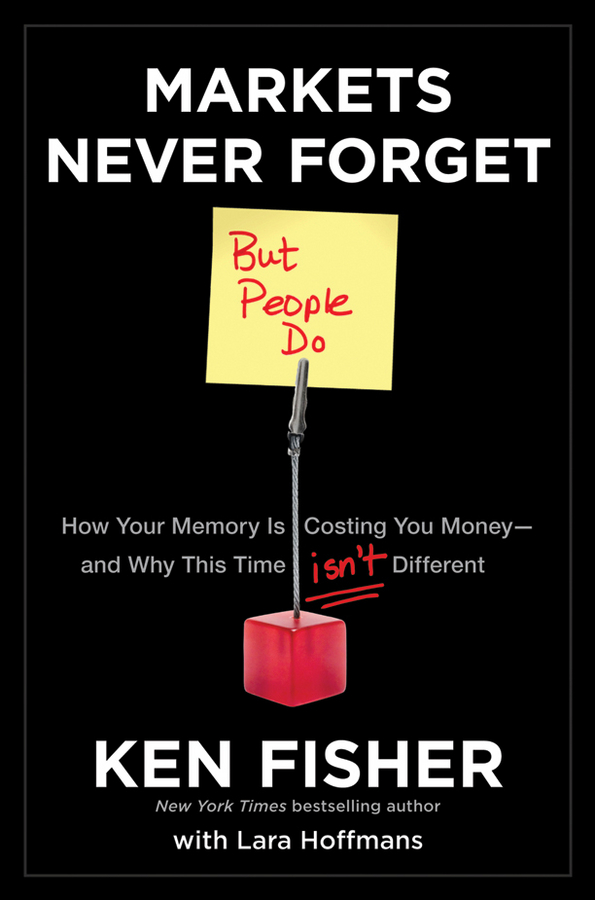Contents
FISHER INVESTMENTS PRESS
Fisher Investments Press brings the research, analysis and market intelligence of Fisher Investments research team, headed by CEO and New York Times best-selling author Ken Fisher, to all investors. The Press covers a range of investing and market-related topics for a wide audiencefrom novices to enthusiasts to professionals.
Books by Ken Fisher
Debunkery
How to Smell a Rat
The Ten Roads to Riches
The Only Three Questions That Count
100 Minds That Made the Market
The Wall Street Waltz
Super Stocks
Markets Never Forget (But People Do)
Fisher Investments Series
Own the World by
Aaron Anderson
20/20 Money by
Michael Hanson
Fisher Investments On Series
Fisher Investments on Energy
Fisher Investments on Materials
Fisher Investments on Consumer Staples
Fisher Investments on Industrials
Fisher Investments on Emerging Markets
Fisher Investments on Technology
Fisher Investments on Consumer Discretionary
Fisher Investments on Utilities
Fisher Investments on Health Care


Copyright 2012 by Fisher Investments. All rights reserved.
Published by John Wiley & Sons, Inc., Hoboken, New Jersey.
Published simultaneously in Canada.
No part of this publication may be reproduced, stored in a retrieval system, or transmitted in any form or by any means, electronic, mechanical, photocopying, recording, scanning, or otherwise, except as permitted under Section 107 or 108 of the 1976 United States Copyright Act, without either the prior written permission of the Publisher, or authorization through payment of the appropriate per-copy fee to the Copyright Clearance Center, Inc., 222 Rosewood Drive, Danvers, MA 01923, (978) 7508400, fax (978) 6468600, or on the Web at www.copyright.com . Requests to the Publisher for permission should be addressed to the Permissions Department, John Wiley & Sons, Inc., 111 River Street, Hoboken, NJ 07030, (201) 7486011, fax (201) 7486008, or online at http://www.wiley.com/go/permissions .
Important Disclaimers: This book reflects personal opinions, viewpoints and analyses of the authors and should not be regarded as a description of advisory services provided by Fisher Investments or performance returns of any Fisher Investments client. Fisher Investments manages its clients accounts using a variety of investment techniques and strategies not necessarily discussed in this book. Nothing in this book constitutes investment advice or any recommendation with respect to a particular country, sector, industry, security or portfolio of securities. All information is impersonal and not tailored to the circumstances or investment needs of any specific person.
Limit of Liability/Disclaimer of Warranty: While the publisher and author have used their best efforts in preparing this book, they make no representations or warranties with respect to the accuracy or completeness of the contents of this book and specifically disclaim any implied warranties of merchantability or fitness for a particular purpose. No warranty may be created or extended by sales representatives or written sales materials. The advice and strategies contained herein may not be suitable for your situation. You should consult with a professional where appropriate. Neither the publisher nor author shall be liable for any loss of profit or any other commercial damages, including but not limited to special, incidental, consequential, or other damages.
For general information on our other products and services or for technical support, please contact our Customer Care Department within the United States at (800) 7622974, outside the United States at (317) 5723993 or fax (317) 5724002.
Wiley also publishes its books in a variety of electronic formats. Some content that appears in print may not be available in electronic books. For more information about Wiley products, visit our web site at www.wiley.com .
Library of Congress Cataloging-in-Publication Data :
Fisher, Kenneth L.
Markets never forget (but people do) : how your memory is costing you money and why this time isnt different / Ken Fisher with Lara Hoffmans. 1st ed.
p. cm.
Includes index.
ISBN 978-1-118-09154-8 (hardback); ISBN 978-1-118-16760-1 (ebk); ISBN 978-1-118-16761-8 (ebk); ISBN 978-1-118-16762-5 (ebk)
1. Investments. 2. Portfolio management. 3. Finance, Personal. I. Hoffmans, Lara. II. Title.
HG4521.F5848 2011
332.6dc23 2011037193
To Bob HopeThanks for the memory.
Preface
Hope Springs Eternal
Bob Hope (19032003) was huge when I was young. Funny, funny, funny! Whether in the Road to ... movies with Bing Crosby (Hope was in 52 major flicks), with the US armed forces overseas wherever conflict occurred at his own personal danger, on TV, doing stand-up, etc., Hope was everywhere. And every performance since 1938 included his anthem, Thanks for the Memory (words by Leo Robin, music by Ralph Rainger and first recorded by Hope and Shirley Ross). Hope was huge and beyond great. And hope springs eternal. Then and now! But sadly, our memories arent so functional. Fact is, our memories are beyond terrible when it comes to economic and market realities.
People forget. So much! So often! So fast! Stuff that happened not long agoand more often than not. And it causes investing errorspretty commonly humongous ones. Maybe Hope should have been singing, Pranks for My Memory . Because for a fact, our memories play pranks on us in markets, and always have and we never learn.
We forget facts, events, causes, outcomes, even feelings . And because we forget, we tend to be hyper-focused on the here-and-now and immediate pastbehavioralists call it myopia . We tend to think what we see is new and differentand significantwhen pretty often, weve seen the exact same thing before or something very close to it and history is littered with similar examples.
This species-wide tendency to myopia isnt accidentalits evolutionary. Humans evolved over millennia to forget pain fast. If we didnt, we wouldnt do crazy things like hunt giant beasts with sticks and stones or plow our fields again after drought, hail, fire, what-have-you destroyed our crops. And for sure no female would ever have more than one kid. But we do forget, and fast.
Forgetting pain is a survival instinct, but unfortunately, that means we also forget the lessons. Then, too, though people individually forget, markets dont. History does not, in fact, repeatnot exactly. Every bear market has a distinct set of drivers, as does every bull market. But human behavior doesnt changenot enough and not very fast to matter. Investors may not remember how panicked or euphoric they were over past events. They may not remember they had the exact same repeating fears over debt, deficits, stupid politicians, high oil, low oil, consumers spending too much, consumers not spending enough, etc., etc., etc. But markets remember very well that details may change but behavior generally doesnt.
For decades, Ive heard otherwise intelligent business folks express (as fact) opinions about current phenomena being extreme, when history shows theyre not extreme or even unusual. Examples are plentiful and throughout this book. But if you point out to someone that his opinion-stated-as-fact is actually false, you will run into a brick wall because he simply wont believe it. They know . They read it in the media or online. Their friends agree. Its a fact to them. It may also be a false fact and one easily known if we didnt simply forget so easily. But because we forget as individuals, we do so as a society, too.







